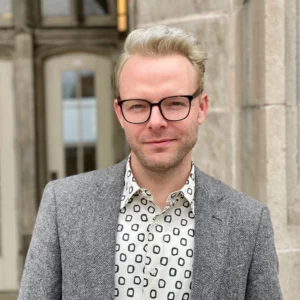Grzanka Named Divisional Dean for Social Sciences

Patrick Grzanka, professor in the Department of Psychology, will serve as the inaugural divisional dean for social sciences in the UT College of Arts and Sciences.
Grzanka joined the Department of Psychology in 2014, and during his first semester, he co-founded the Intersectionality Community of Scholars, an interdisciplinary network of faculty across the university who study intersectionality. It has become the campus’s hub for faculty engaged in intersectionality research, teaching, and scholar-activism and is supported by the UT Office of Research, Innovation, and Economic Development.
“I am incredibly honored and humbled by the opportunity to take on this new role in a time of tremendous change in our college, which has done so much to nurture my career,” Grzanka said. “Our students, faculty, and staff face many challenges as we implement our new divisional structure, but I am enthusiastic about the chance to incubate new visionary interdisciplinary projects, facilitate novel forms of collaboration within and beyond the Division of Social Sciences, grow our departments and programs to sustain our booming enrollment, and to unequivocally communicate our values to campus and community stakeholders.”
In 2015, Grzanka was part of a college-level committee tasked with reconstituting Women’s Studies; the committee launched the college’s Women, Gender, and Sexuality (WGS) Interdisciplinary Program in 2016. Under his leadership, the program has grown in both majors and minors and introduced a graduate certificate that nearly 20 students enroll in each year.
Grzanka is an accomplished scholar and was named a Fellow of the American Psychological Association in 2023 for his “unusual and outstanding contributions . . . in the field of psychology.” He co-edited a special issue of American Psychologist in 2021 focused on public psychology and was elected president of the Society for the Psychological Study of Social Issues (American Psychological Association, Division 9) for 2023-24.
“The six departments that constitute the Division of Social Sciences represent the vanguard of theory and methods that seek to understand our local, national, and global societies with sensitivity to power, culture, and the historical conditions that structure our lives,” Grzanka said. “We are social scientists, humanists, biologists, and more. The interdisciplinary breadth of our division is a key strength of our community and one that I take seriously as an interdisciplinary scholar myself.”
Grzanka will begin his appointment July 1, 2023. As divisional dean, Grzanka will work with faculty, departmental administration, and members of the college office to develop and implement faculty affairs policies and procedures that support the faculty’s central role as scholar-teachers in the mission of the college and the university. Divisional deans will serve as advocates for the units and faculty, staff, and students in their divisions. In his role, Grzanka will collaborate with members of the college office to build and maintain an environment that enables and empowers world-class research and creative activity, teaching, and engagement.
“Our students and faculty are passionate about identifying the causes of vexing problems and developing solutions that enhance the lives and well-being of the groups with whom we study and learn,” Grzanka said. “As divisional dean, I want to help those in the social sciences and across the college actualize their ambitions for doing groundbreaking work. I can think of no greater privilege as a campus leader. I am excited to get to work.”
About the College of Arts and Sciences Divisional Structure Pilot
In September 2022, the UT Chancellor announced a plan for establishing a divisional structure within the College of Arts and Sciences. Under the model, beginning July 1, 2023, the college will be organized around three broad divisions: Arts and Humanities, Social Sciences, and Natural Sciences and Mathematics. Each division will be led by a divisional dean who will report to the executive dean. The divisional structure is a pilot and its effectiveness will be assessed after two years. Robert Hinde is the interim executive dean working with the provost, college leadership, faculty, and staff to create a divisional structure designed to meet the various needs of the college. Read more about the pilot on our website.